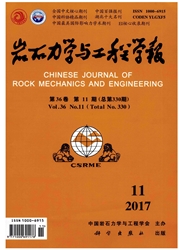

 中文摘要:
中文摘要:
系统分析淮南矿区深部煤巷围岩赋存的地质特征、控制难度和应力状态等因素,确定影响煤巷稳定及锚杆支护选型的最主要和敏感因素为巷道顶板应力强度指数、帮部煤体松散范围系数、顶板软弱岩层不安全因子3个综合指标,通过大量测试矿区深部巷道围岩地应力和煤岩试块物理力学性能,对这3个综合指标体系进行科学合理分类,在此基础上划分深部煤层巷道围岩稳定性控制难度级别,针对各难度级别,提出以新型“三高”(高强度、高预拉力、高刚度1锚杆控制技术为基础的深部煤巷围岩控制对策。应用该方法对矿区几个典型矿井的深部煤层巷道围岩稳定程度进行难度分级,采取针对性技术措施和支护参数,维护巷道稳定。研究成果在淮南矿区获得全面应用,对我国煤矿深部煤层巷道支护技术具有一定的理论意义和实用价值。
 英文摘要:
英文摘要:
On the basis of systematic analysis of geological characteristics and controlling difficulty of deep surrounding rocks, stress conditions, three sensitive factors that influence roadway stability and bolting selection were determined. Through extensive tests on deep roadway underground stress, physico-mechanical properties of both coal and rock, a comprehensive 3-index system, namely roof stress strength index, rib loose broken coefficients and unsafe weak roof indicator, was established to make scientific classification of roadway stability and propose corresponding controlling techniques as well. The whole set of deep roadway bolting technology highlighted by "three-high", i. e. high strength, high pretension force and high stiffness was presented. After several successful engineering practices, research results have been adopted in Huainan colliery, showing great theoretical and practical values to deep coal roadway support in China.
 同期刊论文项目
同期刊论文项目
 同项目期刊论文
同项目期刊论文
 期刊信息
期刊信息
